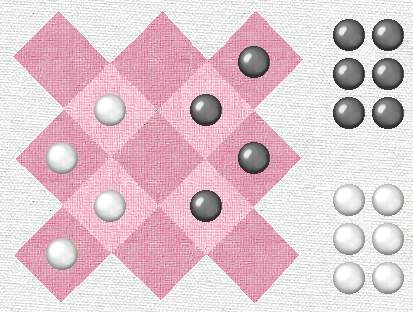

The name of this game has not been recorded so I adopt the name Queah, until somebody corrects me. It derives from Liberia and the Queah tribe. The board is sometimes made of interwoven twigs. As pieces are then used sticks, one side having the top cut aslant for the ‘men’, the other having the tops cut straight for the ‘women’.
Each player has ten men, four of which are placed on the board, and six beside. The pieces move one step along the slanted lines and capture one enemy at a time by the short leap, and his opponent then enters a man to restore his number of four pieces on the board until his stock is exhausted. Capture is mandatory. Win is achieved by capturing all the opponent’s pieces. Note that one is only allowed to drop a piece when a friendly piece has been captured.
Due to the small size of the board (13 squares), zugzwang is an important aspect of this game, when the opponent is forced to put a piece ‘en price’, as there are no good squares to move to. Games are often decided in the endgame, when all pieces have been dropped. The player with the most advantageous position will win the game.
Liberia is a republic in West Africa where many emancipated slaves emigrated from the U.S. Today descendants of emancipated slaves make up no more than 5% of the population. The rest of the population consists of several indigneous people. The total population of Liberia (1989 est.) is 2,508,000. The interior is heavily forested; mountains reach elevations of about 900 to 1200 m (about 3000 to 4000 ft). Many comparatively small rivers traverse the country.
References
Büttikofer, J. (1882). ‘Einiges über die Eingebornen von Liberia’, in Internationale Archiv für Ethnographie.
Murray, H.J.R. (1952). A History of Board-games other than Chess. Oxford University Press.
☛ You can download my free Liberian Queah program here, but you must own the software Zillions of Games to be able to run it.
© Mats Winther 2006